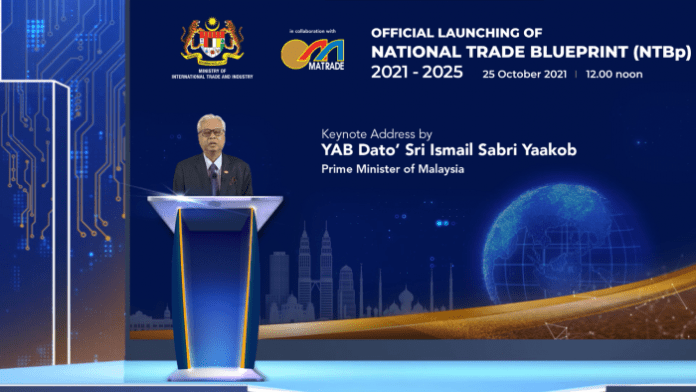Prime Minister Dato’ Sri Ismail Sabri has launched the National Trade Blueprint aimed to increase Malaysia’s trade competitiveness through the implementation of an improved business ecosystem.
The Blueprint outlines a 5-year (2021-2025) development strategy and initiatives to enhance Malaysia’s trade competitiveness, specifically in the exports of merchandise with the target of positioning Malaysia as a dynamic and pre-eminent trading nation through sustainable export development.
Additionally, this will provide opportunities to augment Malaysia’s institutional frameworks to lift the export economy onto a growth trajectory. This will be achieved by complementing other current policies and masterplans by converging objectives, reconciling initiatives, and bringing together the various stakeholders in the value chain towards the central goal of an export framework. It aims to also attune to the current trade landscape in the light of the rapidly evolving global trends while addressing the business community’s needs.
The Blueprint’s framework is guided by 4 strategic priorities, 3 strategic themes and 8 strategic thrusts with 40 recommendations to improve and enhance Malaysia’s trade competitiveness.
Among the specific areas under the ecosystem covered are Trade Facilitation & Logistics, Standards & Conformance, Trade Promotion & Market Access, Sustainability & Innovation, Digitalisation & Technology as well as Investment and Branding.
Each strategic thrust will pursue a set of key strategies according to the specific areas to fulfil its strategic aim. A number of action plans are identified that will facilitate and enhance trade competitiveness throughout the business ecosystem.
Senior Minister Dato’ Seri Mohamed Azmin Ali, who is also the Minister of International Trade and Industry, “It is heartening to note that the synergies between the public and private sectors in pooling their resources to formulate this valuable document as we continue working to propel the nation’s economy”,
To implement and monitor the recommendations, 8 Working Groups (WGs) have been formed according to their specific areas within the ecosystem. For efficiency, these WGs shall report to the existing Jawatankuasa Koordinasi Eksport (JK-X), chaired by the Chief Secretary to the Government of Malaysia.









